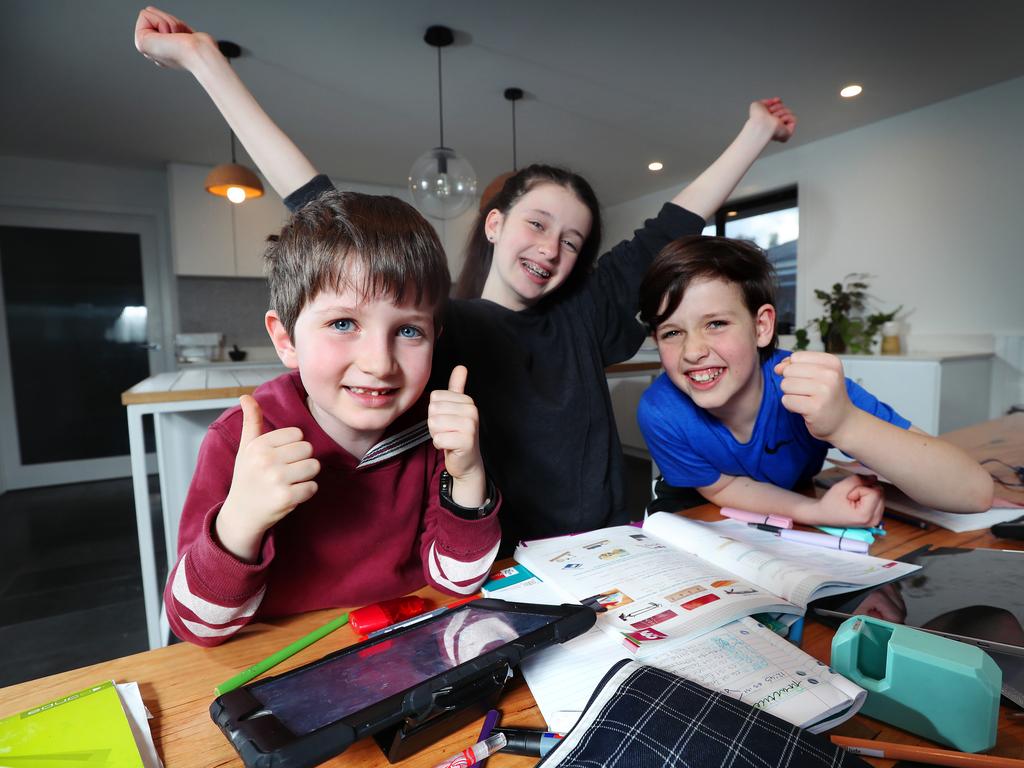NAPLAN tests reveal Australian kids have powered through the pandemic
The latest NAPLAN results produced some unexpected outcomes. See how students in your state performed.
Primary school students have gained a term’s worth of learning in maths and english since national tests started 13 years ago, the latest exam results show.
Surprising new NAPLAN (National Assessment Program in Literacy and Numeracy) data from this year’s test in May reveals improvements in reading, spelling and grammar for students in years 3 and 5, and in numeracy, reading and spelling for Year 5 students – despite school closures during the Covid-19 pandemic.
Results in all other fields and year levels were little-changed from the previous NAPLAN test in 2019.
Federal Education Minister Alan Tudge hailed teachers and the “resilience” of 1.2 million students who sat the national tests.
“I remain very concerned about the ongoing impact of school closures on young people and their families, particularly the mental health impacts,” Mr Tudge said.
“I am also concerned that some individual families have really struggled with schooling and may have disengaged altogether.
“We need to continue to focus on getting Australians vaccinated so we can get schools open and kids back into the classroom, back into sport and back with their friends and extended family.”

Australian Curriculum, Assessment and Reporting Authority (ACARA) chief executive David de Carvalho said the pandemic had “no significant impact’’ on students’ maths and English skills up to Year 9.
“It’s the good news many of us need to hear right now,” he said.
“It’s reassuring to see that overall, our students’ literacy and numeracy standards have not significantly suffered … despite the disruption from Covid-19 and the remote learning experience.
“Some might find this surprising but it’s important to note this is big picture data and there are likely to be some students who have been affected.”
Mr de Carvalho said the results were “testament to the resilience of students, teachers, parents and carers, and school and system leaders during these challenging times.’’
This year’s NAPLAN test – for students in Years 3, 5, 7 and 9 – was the first since 2019, after Covid-19 lockdowns forced the cancellation of the national exams in 2020.
Parents will be sent details of their child’s results from mid-September, with each state and territory to set a date.
Details of how the pandemic has affected girls and boys, Indigenous children, kids from migrant backgrounds and those from poorer families will be made public in December.
Mr de Carvalho said children in Years 3 and 5 had gained a term’s worth of learning in reading, while kids in Years 5, 7 and 9 had gained a term’s worth of learning in maths, since NAPLAN tests began in 2008.
But writing standards have fallen over the past decade for Year 9 students in Victoria, Queensland and the ACT, for Year 7 students in Queensland and Year 5 students in the ACT.
The NAPLAN data shows that one in every 16 students is starting high school without meeting the basic standard for reading – the same result as in 2008.
One in 10 kids is failing to write to the minimum literacy standard during the first year of high school, in Year 7.
Students fall further behind over time, with one in six Year 9 students failing to write to a basic level.
Children have gone backwards in maths, with 6.5 per cent of Year 7 kids failing to meet the minimum standard for numeracy this year – up from 4.6 per cent in 2008.

Victorian children are the best readers, with 97.1 per cent of Year 7 students reaching the minimum standard compared to 94.3 per cent in the ACT, 93.9 per cent in NSW, 93.3 per cent in South Australia, 93.1 per cent in Queensland, 92.5 per cent in Western Australia, 91 per cent in Tasmania and 67 per cent in the Northern Territory.
In maths, Victorian kids top the class with 96.4 per cent of Year 7 students passing the minimum standard, compared to 94.5 per cent in the ACT, 93.6 per cent in NSW, 92.5 per cent in Queensland and South Australia, 90.3 per cent in Tasmania and 66.6 per cent in the Northern Territory.
Federal parliamentary education chairman Andrew Laming said the mean scores would disguise low marks from children who are struggling with home schooling.
He said students from disadvantaged families were least likely to sit the NAPLAN tests.
“Increased scores for well-resourced families where home learning is supported will mask falls in other schools which also have far lower NAPLAN attendance to begin with,” he said.
Originally published as NAPLAN tests reveal Australian kids have powered through the pandemic



